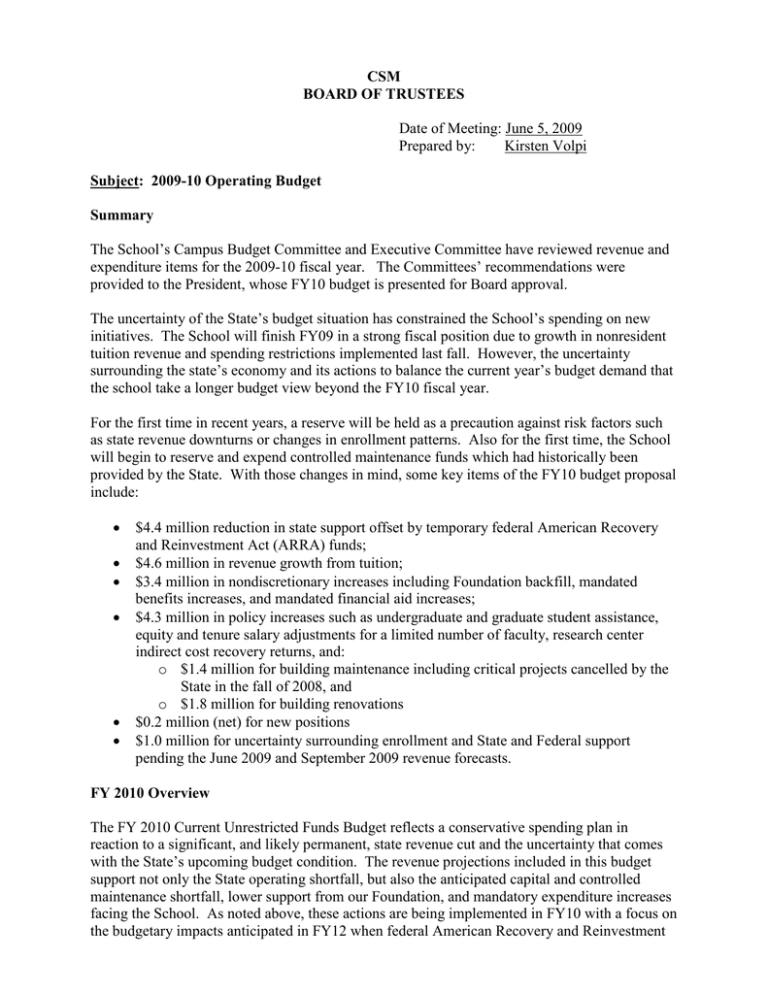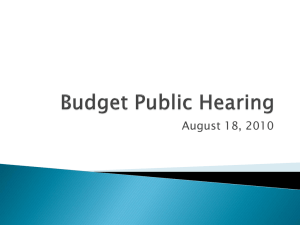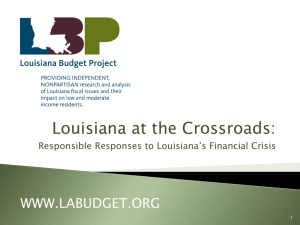CSM BOARD OF TRUSTEES Date of Meeting: June 5, 2009
advertisement

CSM BOARD OF TRUSTEES Date of Meeting: June 5, 2009 Prepared by: Kirsten Volpi Subject: 2009-10 Operating Budget Summary The School’s Campus Budget Committee and Executive Committee have reviewed revenue and expenditure items for the 2009-10 fiscal year. The Committees’ recommendations were provided to the President, whose FY10 budget is presented for Board approval. The uncertainty of the State’s budget situation has constrained the School’s spending on new initiatives. The School will finish FY09 in a strong fiscal position due to growth in nonresident tuition revenue and spending restrictions implemented last fall. However, the uncertainty surrounding the state’s economy and its actions to balance the current year’s budget demand that the school take a longer budget view beyond the FY10 fiscal year. For the first time in recent years, a reserve will be held as a precaution against risk factors such as state revenue downturns or changes in enrollment patterns. Also for the first time, the School will begin to reserve and expend controlled maintenance funds which had historically been provided by the State. With those changes in mind, some key items of the FY10 budget proposal include: • • • • • • $4.4 million reduction in state support offset by temporary federal American Recovery and Reinvestment Act (ARRA) funds; $4.6 million in revenue growth from tuition; $3.4 million in nondiscretionary increases including Foundation backfill, mandated benefits increases, and mandated financial aid increases; $4.3 million in policy increases such as undergraduate and graduate student assistance, equity and tenure salary adjustments for a limited number of faculty, research center indirect cost recovery returns, and: o $1.4 million for building maintenance including critical projects cancelled by the State in the fall of 2008, and o $1.8 million for building renovations $0.2 million (net) for new positions $1.0 million for uncertainty surrounding enrollment and State and Federal support pending the June 2009 and September 2009 revenue forecasts. FY 2010 Overview The FY 2010 Current Unrestricted Funds Budget reflects a conservative spending plan in reaction to a significant, and likely permanent, state revenue cut and the uncertainty that comes with the State’s upcoming budget condition. The revenue projections included in this budget support not only the State operating shortfall, but also the anticipated capital and controlled maintenance shortfall, lower support from our Foundation, and mandatory expenditure increases facing the School. As noted above, these actions are being implemented in FY10 with a focus on the budgetary impacts anticipated in FY12 when federal American Recovery and Reinvestment Act of 2009 (ARRA) funds are exhausted and the state’s budget will be constrained by spending requirements and revenue limits. Below is an overview of revenue and expenditure changes by category. Current Unrestricted Revenue State Support and ARRA Supplement State support was reduced for all of higher education by $150 million in FY09; this reduction is anticipated to be a permanent reduction of the higher education base. For the Colorado School of Mines, our share of the total reduction is $4.4 million. Pursuant to the federal ARRA requirements, the State has committed to use ARRA funds in FY09, FY10, and FY11 to backfill higher education. This action was driven by the guidelines contained in the federal ARRA which requires state’s using ARRA State Stabilization funds to provide a minimum of: 1) state funding at FY06 levels; and 2) a combination of state and federal funding at FY09 levels. These minimums necessitate a $4.4 million reduction in our current state appropriation with a dollar for dollar substitution with federal ARRA support. The Long Bill includes these changes for FY09 and FY10. The state reductions come from the College Opportunity Fund (COF) stipends and Fee for Service contracts. Therefore, resident undergraduate student COF stipends will decrease from $92 per credit hour to $68 per credit hour, while the Fee for Service contract will decrease from $15.8 million to $13.3 million. The ARRA funds expire after FY11, and it is unclear how or if the state will be able to increase its support for higher education to replace the $4.4 million beginning in FY12. Tuition Revenue The largest source of new revenue is tuition ($4.6 million). Tuition increases of 7.8% for resident students and 3.9% for nonresident students, coupled with strong graduate enrollment growth will provide the majority of new funds in FY10. This budget assumes that we will have 950 new freshmen students, and 87 new graduate students. Growth in the freshmen class should come from resident students, while approximately three-quarters of the graduate growth will come from residents. Other Sources Other sources of increased revenue include; • • • most fees increasing by inflation (there are few exceptions) a 5% increase in indirect cost recoveries ($400,000). Award activity has increased significantly in FY09, and these awards will begin spending in FY10. income from Auxiliary operations of $0.7 million as a result of increases in charges for student services, housing, and meal plans. Housing rates are proposed to increase by 3%, while meal plans are proposed to increase by 4%. Current Unrestricted Expenses Non Discretionary Increases A significant mandatory increase is the need to cover CSM Foundation obligations with Current Unrestricted Funds ($1.2 million). Foundation spending limits will be reduced in excess of $2.0 million for FY10. The majority of Foundation spending reductions will impact financial aid awards, while academic faculty support is the second largest category. Not all current expenditures will require 100% backfill, but it is likely that most obligations will require support 2 for several years as the Foundation absorbs the current year decline in asset values. Any Current Unrestricted Funds not needed in FY10 will be made available for FY11 obligations. Other mandated expenditures include fringe benefit increases for all employees ($1.1 million), increased utility costs ($225,000), statutory increases to undergraduate financial aid ($295,000), and the rescission of Colorado state-funded financial aid ($275,000). State-funded financial aid was reduced to balance the state’s budget in FY10, and CSM’s share of the statewide reduction is $275,000. Also included is annualization of positions hired prior to July 2009, including the new Provost position ($212,000). Fringe benefits costs are increasing due to mandated increases in PERA retirement contributions and increased contributions to health, life, and dental insurance. Other mandated increases include software licensing agreements, state charges for the financial audit, Risk Management, and work performed by the Attorney General’s Office ($175,000). Policy Directives As in recent years, the Board has aligned increases in faculty salaries with classified staff increases. For FY10, the state will not be increasing classified salaries, keeping them at their current level. Commensurate with no classified staff increase, we are recommending no faculty salary increases. A small pool of funds ($500,000) has been set aside for individual faculty tenure decisions and any equity or retention issues that arise during the year. School practice has been to direct a portion of the increase in undergraduate tuition revenue to financial aid. This results in financial aid in excess of the statutory requirement ($320,000). Likewise, additional nonresident enrollment at the graduate level will require additional funds for the Nonresident Fellowship program ($166,000). Finally, by policy, a portion of the indirect costs recovered for sponsored research are returned to research centers or departments that house the research ($71,000). Building Maintenance and Renovations Also new for FY10 are two budget items for infrastructure; Building Maintenance and Building Renovations. Due to the State’s rescission of $1 million of Controlled Maintenance funds in FY09 - along with discussion by the Joint Budget Committee that Controlled Maintenance funds for Higher Education will be very unlikely in the future - we have incorporated a building maintenance component of the budget in order to support the school’s aging infrastructure. The state’s Controlled Maintenance Fund has typically funded an average of $1.5 million annually for academic and administrative buildings and general infrastructure. The FY10 building maintenance budget item includes the two projects rescinded by the State in FY09: 1) phase one of a replacement of the HVAC system in Brown Hall; and 2) campus steam line repairs (totaling $1 million). The budget also includes an additional $1.8 million to address other near-term projects which will not be funded by the state for the foreseeable future, including renovations to Hill Hall to support the recently NSF funded Materials Research Science and Engineering Center ($800,000), renovation of the elevators in Weaver Towers ($400,000), and other smaller campus renovation projects. New Positions New positions and increases in existing positions are relatively small due to hiring and promotion constraints implemented in fall 2008. 3 New faculty positions include all faculty searches in which a contract has been offered. Many searches were put on hold pending the outcome of the state’s Long Bill discussions – these searches will be revisited with the Provost over the summer. In total, new faculty positions represent salary, benefit and start-up commitments of $1.1 million. This is offset by departing faculty salary and benefits of $1.5 million. New faculty positions include a Department Head, a Division Director, six tenure-track positions, and four lecturer positions. These positions are offered in the following areas: • • • • • • • Petroleum Engineering – Department Head (pending search) LAIS - Division Director, 1 Assistant Professor, 1 Lecturer Math and Computer Science - 1 Assistant Professor, 3 Lecturers Chemistry - 1 Assistant Professor Metallurgy and Materials Engineering - 1 Associate Professor Physics - 1 Assistant Professor Nuclear Engineering - 1 Assistant Professor Also included in the FY10 budget is one new administrative faculty position, and additional funding to retain a second administrative faculty position through the end of FY10 only. The new position is pursuant to an organizational realignment in the Student Life area. Auxiliary Increases Auxiliary increases are driven primarily by actual increases in operating costs - utilities, full operations of the new recreation center, food service contract increases, and other increases. Temporary Items As a result of the unprecedented volatility in the state and national economies, the FY10 budget includes reserves to guard against unexpected declines in state support or enrollment. A total of $1.0 million, representing approximately 1.5% of tuition and fee revenue, will be held pending the outcome of the June and September state revenue forecasts and the fall census enrollment figures. Should current assumptions hold and these reserves are not needed to balance the FY10 budget, we will have two areas that require additional funds: 1) adjunct professors, and 2) undergraduate student financial aid. Spending budgets for these items are minimal, and should our enrollment remain strong, both areas will require additional resources. Current Restricted Funds Current Restricted Funds include sponsored research, state, federal, and private financial aid, and CSM Foundation support. Activity in these funds is dedicated to a specific purpose according to the source of funds. Sponsored research activity continues to increase in both award volume and fiscal expenditures. Foundation activity is projected to contract in FY10 due to reduced spending limits applied to the Long Term Investment Pool (LTIP). Financial aid activity will be mixed with federal aid increasing as a result of higher Pell Grant limits, while state aid will be reduced due to state budget reductions. Sponsored Research Sponsored research spending is projected to increase by 5% in FY10 due to higher award activity during FY09. Award volume through April is 27% ahead of FY08 volume. This will lead to greater research expenses in FY10 as awards are executed. 4 Foundation Spending Foundation spending is estimated to decrease by approximately $2 million in FY10. Foundation spending limits are falling due to a reduction in the payout percentage (reduced from 5.25% to 4.5%) of the Long Term Investment Pool in addition to the decrease in the market value of the LTIP. As noted above, obligations currently paid by CSM Foundation funds will be covered with Current Unrestricted funds in FY10. Colorado School of Mines Foundation Unrestricted Budget The Colorado School of Mines Foundation unrestricted budget will be discussed at the meeting. 5 Colorado School of Mines Board of Trustees Resolution BE IT RESOLVED that the Board of Trustees of the Colorado School of Mines hereby approves the FY 2010 All Funds Operating Budget, including: o The Colorado School of Mines operating budget; and o The Colorado School of Mines Foundation unrestricted budget. The Board further grants the President of the School the ability to realign as needed un-utilized reserves while maintaining a balanced budget. DONE AND SIGNED in an open meeting of the Board of Trustees of the Colorado School of Mines in Golden, Colorado, on this sixth day of June 5, 2009. _____________________________ Michael S. Nyikos Chairman Colorado School of Mines Board of Trustees 6




